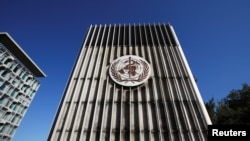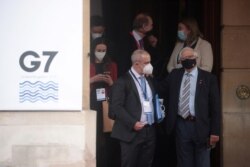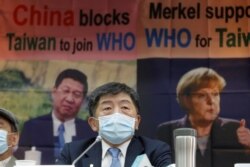Leading industrial nations came out in support of Taiwan's observer status in the World Health Assembly (WHA), the decision-making body of the World Health Organization (WHO), leading into this year's annual meeting May 24 to June 1.
It is the first time the Group of Seven as a whole has backed Taiwan's inclusion in the WHA.
"We support Taiwan's meaningful participation in World Health Organization forums and the World Health Assembly. The international community should be able to benefit from the experience of all partners, including Taiwan's successful contribution to the tackling of the COVID-19 pandemic," the G-7 said in a joint communique Wednesday after foreign ministers gathered this week in London.
Taiwan said it is grateful for the G-7's strong support.
"#Taiwan thanks all G7 FMs and the EU for voicing such a strong support in the Communique for our meaningful participation in #WHO & #WHA. #LetTaiwanHelp and contribute to the global health system," Taiwan's main representative office in the U.S. said in a tweet.
Officials from Australia, India, South Africa, South Korea and Brunei are also joining the G-7 Foreign and Development Ministers' Meeting as guests in London.
"We underscore the importance of peace and stability across the Taiwan Strait, and encourage the peaceful resolution of cross-Strait issues. We reiterate our strong opposition to any unilateral actions that could escalate tensions and undermine regional stability and the international rules-based order, and express serious concerns about reports of militarization, coercion and intimidation in the region," said the communique, which was released after the meeting.
The statement comes as China steps up military activities, sending aircraft into Taiwan's air space.
"It is very consequential that democracies are speaking with one voice on an important occasion like the G-7 to underscore their support for Taiwan's participation" in the World Health Organization, said Bonnie Glaser, Asian program director at the German Marshall Fund of the United States.
Other analysts said Wednesday’s G-7 communique underscores the deep and abiding concern Western countries plus Japan have about China’s increasingly coercive activities in the Indo-Pacific region.
“Let’s also not lose sight of the fact that the G-7 statement included references to China’s bad behavior in places like Hong Kong, Xinjiang, and Tibet, which certainly won’t sit well with Beijing either,” said Derek Grossman, a senior defense analyst at the RAND Corporation.
The move is seen as an open rebuke to China. The Beijing government has been blocking Taiwan's representation at WHO meetings after the self-ruled democracy elected Tsai Ing-wen, a China skeptic, as Taiwan's president in 2016 and again in 2020.
Delegates from Taiwan had attended the World Health Assembly as nonvoting observers from 2009 to 2016, during a period of relatively warm ties between Beijing and Taipei.
Non-member states and territories can participate in the WHA as observers.
On Monday, China's ambassador to the United Nations, Zhang Jun, repeated Beijing's opposition to invite Taiwan to the WHA sessions later this month.
"It is our clear position and firm position that the U.N. is an organization composed of sovereign member states, and Taiwan is not qualified for any participation in these organizations," Zhang said when he was asked if Taiwan should be allowed at the WHA as an observer.
"Beijing's actions to block Taiwan from participating in the WHO are counterproductive" and do not serve the interests of the broader international community, Glaser told VOA on Wednesday.
A senior U.S. official told reporters that Taiwan has "a lot of experience" in fighting the spread of the coronavirus, which "can help all of us, and it just seems really self-defeating to exclude them."
In Washington, Democratic and Republican members of Congress have spoken up in recent weeks to support Taiwan's participation in the World Health Assembly.
Chairman of Senate Foreign Relations Committee Bob Menendez, a Democrat, said in a tweet that "Beijing's efforts to shut Taiwan out of the international community hinder pandemic recovery & response." Menendez called on the Senate to pass a bipartisan bill "championing Taiwan's participation in the World Health Assembly."
Republican Senator Jim Risch, the ranking member of the Senate Foreign Relations Committee, denounced WHO for sidelining Taiwan in the last four years "despite its vast expertise & successful handling of #COVID19."
"I hope that in 2021, this will not be the fifth. #LetTaiwanHelp, & we will all be better for it," Risch said in a tweet.






